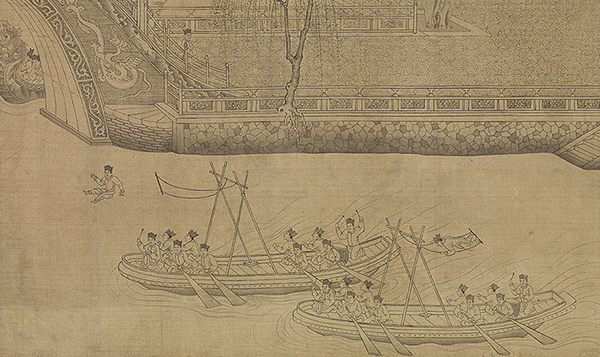Prosperity created leisure culture in Song Dynasty

Shui Qiuqian: a diving game of the Song Dynasty
During the Tang and Song dynasties, there were radical changes to the social class structure and relations of production. One prominent feature of social culture in the Song Dynasty (960-1279) was the growing popularity of leisure activities in cities.
The culture of leisure that formed in the Song Dynasty originated among noblemen and later spread to common people. Economic progress fostered unprecedented interest and enthusiasm for sports, entertainment, food, architecture and other aspects of leisure culture.
Among the most popular sports in the Song Dynasty was xiangpu, a form of wrestling. Troops and ordinary people alike participated in xiangpu. The imperial courts had their own specialized wrestling teams featuring members drawn from the ranks of soldiers. Wrestling associations were common in civilian society as well.
Another popular leisure activity during the Song Dynasty was shuiqiuqian in which two boats equipped with qiuqian (Swing Wood boards) would be positioned on a lake. Swimmers would walk out on the boards and jump into the river.
There are many reasons why leisure culture thrived in the Song Dynasty. The first is its stable political environment. A stable political environment is the prerequisite for social harmony, and leisure culture can only develop in a harmonious society. Despite its military weakness and the threat of aggression from foreign tribes, there were no massive wars in that period and the domestic social environment was relatively stable, which ensured that people could live and work in peace. This is the external factor that drove the proliferation of leisure culture.
The second reason is the economic boom, which provided the material foundation for leisure activities. Economic development in the Song Dynasty enabled people to afford these activities.
The third is that rulers in the Song Dynasty were open-minded and enlightened in their ruling policy, which provided a loose and easy political and cultural environment. China’s three traditional branches of philosophy—Confucianism, Buddhism and Taoism— all developed in parallel in the Song Dynasty, leading to innovation and breakthroughs in all fields in that period.
The Song Dynasty placed an emphasis on education. People were encouraged to study, and shuyuan (academies) were built on a large scale, which promoted literacy and cultural development.
The fourth reason is that free time for leisure activities in the Song Dynasty increased over previous dynasties. Officials then had an average of 100 days off annually at that time, which facilitated their engagement in leisure activities. For common people, free time for leisure activities varied according to occupation. The economic prosperity allowed some to live in plenty. They were freed from heavy labor, which gave them time and energy for leisure.
The last reason is that the Song Dynasty invested money to build and renovate leisure equipment and facilities. Rich people were also willing to fund places for entertainment for the common good. One example was the growing popularity of luxury restaurants. Unlike those non-profit and official restaurants in the Tang Dynasty (618-907), these restaurants were built according to the law of economic development and customers’ requirements as well. They contributed to the formation and dissemination of leisure culture.
